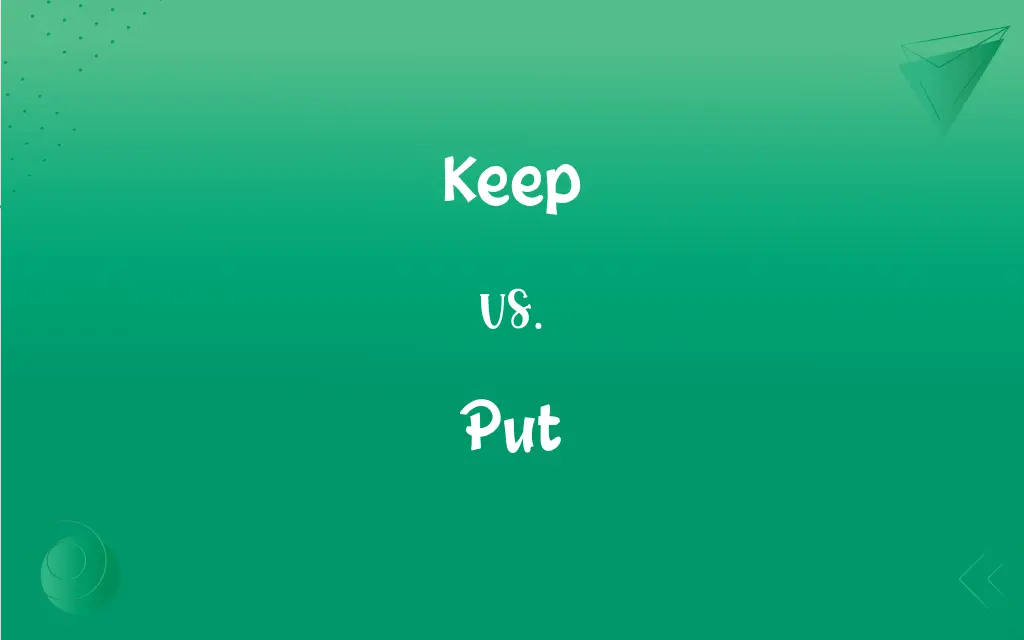Keep vs. Put: What's the Difference?
Edited by Aimie Carlson || By Harlon Moss || Updated on October 23, 2023
"Keep" denotes retention or maintenance, while "put" means to place or position.

Key Differences
"Keep" and "put" are both common English verbs, but their primary functions differ. "Keep" typically suggests the act of holding onto something or maintaining its current state. For instance, to "keep" a promise means to adhere to or uphold it. On the other hand, "put" primarily concerns the act of positioning or placing something in a location.
"Keep" can also convey the idea of continuing an action or refraining from stopping something. For example, to "keep" running means to continue the act of running. In contrast, "put" can imply a transfer of possession or placement of importance on something. Like, when someone says they "put" trust in someone, it means they place their confidence in that person.
Another distinction is in their use in idiomatic expressions. The word "keep" is often used in phrases that relate to persistence or conservation, such as "keep the faith" or "keep in touch." Meanwhile, "put" can be found in expressions like "put forth effort" or "put on a brave face," where the emphasis is on an action or a presentation.
In terms of grammar, both "keep" and "put" can be followed by an object. However, "put" often requires a destination or location afterward, especially when used in a literal sense. For example, one can "put" a book on a shelf, whereas with "keep," the location or destination isn't always necessary; you can simply "keep" a book.
While both verbs have numerous meanings and can be employed in various contexts, their fundamental essence remains. "Keep" relates to retention, continuation, or protection, whereas "put" concerns placement, expression, or assignment.
ADVERTISEMENT
Comparison Chart
Primary Function
Retention or maintenance
Placement or positioning
Idiomatic Usage
Used in phrases about persistence or conservation
Used in phrases about action or presentation
Grammatical Follow-up
Can be followed by an object
Often requires a destination or location after
Semantic Nuance
Relates to continuation, protection
Concerns assignment, expression
Common Phrasal Verbs
Keep up, keep out, keep away
Put up, put out, put away
ADVERTISEMENT
Keep and Put Definitions
Keep
To retain possession of.
I keep my old letters in a box.
Put
To express or phrase in a certain way.
He put it very eloquently.
Keep
To continue doing an action.
She keeps trying despite the challenges.
Put
To place or set in a position.
She put the vase on the table.
Keep
To preserve or maintain in a particular condition.
Please keep the door closed.
Put
To cause to undergo or experience.
They put me through a lot of stress.
Keep
To refrain from divulging a secret.
Can you keep a secret?
Put
To invest time, effort, or resources into something.
I put a lot of work into this project.
Keep
To provide for or sustain.
His job keeps his family.
Put
To assign or attribute.
She put the blame on me.
Keep
To retain possession of
Kept the change.
Must keep your composure.
Put
To place in a specified location; set
She put the books on the table.
FAQs
When using "put" in a sentence, is a destination often required?
Yes, "put" often requires a destination, like "put it on the table."
What does "put" primarily convey?
"Put" primarily conveys the act of placing or positioning something.
Can "keep" suggest a continuous action?
Yes, "keep" can suggest continuing an action, like "keep going."
Which word implies retaining or holding onto something?
"Keep" implies retaining or holding onto something.
Does "put" have a sense related to expression or articulation?
Yes, as in "how he put it" or "putting thoughts into words."
What is the action conveyed by "put forth"?
"Put forth" conveys presenting or introducing, often an effort or idea.
Is "keep away" an instruction to prevent access?
Yes, "keep away" instructs to prevent someone or something from coming near.
Can "keep" be used about emotions or behaviors?
Yes, like "keep calm" or "keep quiet."
What action does "put down" convey?
"Put down" can convey placing something on a surface or criticizing someone.
Does "keep" have a protective sense?
Yes, "keep" can have a protective sense, as in "keep someone safe."
Which verb relates more to conservation or protection?
"Keep" often relates to conservation or protection.
Is "keep" used in the phrase "keep in touch"?
Yes, "keep in touch" is a phrase using the word "keep."
What's a common phrasal verb using "put"?
"Put away" is a common phrasal verb using "put."
Can "keep" suggest maintaining a state or condition?
Yes, like in the phrase "keep the peace."
Can "keep" relate to nurturing or caring?
Yes, as in "she keeps several pets" or "keep oneself healthy."
In which phrase does "put" refer to postponing?
"Put off" is a phrase where "put" refers to postponing something.
Can "put" imply an assignment or designation?
Yes, you can "put" someone in charge or "put" importance on a task.
Can "keep" relate to a promise?
Yes, one can "keep" a promise, meaning to uphold or adhere to it.
What does "put up" suggest?
"Put up" can suggest erecting something or tolerating a situation.
Can "put" imply a transfer of trust or confidence?
Yes, you can "put" trust or confidence in someone.
About Author
Written by
Harlon MossHarlon is a seasoned quality moderator and accomplished content writer for Difference Wiki. An alumnus of the prestigious University of California, he earned his degree in Computer Science. Leveraging his academic background, Harlon brings a meticulous and informed perspective to his work, ensuring content accuracy and excellence.
Edited by
Aimie CarlsonAimie Carlson, holding a master's degree in English literature, is a fervent English language enthusiast. She lends her writing talents to Difference Wiki, a prominent website that specializes in comparisons, offering readers insightful analyses that both captivate and inform.































































